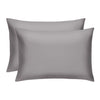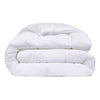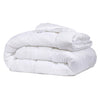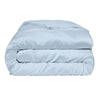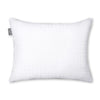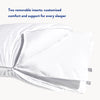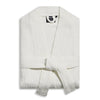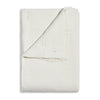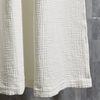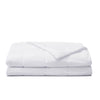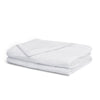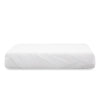The Daily Miracle
How Often Should You Wash Your Blankets?
Published
September 20, 2022
Author
Bridget Reed

Your bedroom is your sanctuary! When your life is going a mile a minute, and you have to figure out how to juggle work, family life, hobbies, and social life, it can sometimes feel like the only place where you finally get to just… be.
Even if you’re not getting the chance to go to bed until late in the evening and have to be up again at the crack of dawn, just having a little time to unwind in your own space can help your mental health. In fact, good sleep habits are as important to your health as a balanced diet and regular exercise.
Optimizing your sleeping situation is one of the many things you can do to ensure your sanctuary is as restful and relaxing as possible. Whether that’s a comfy mattress, decor that soothes and comforts you, candles, or the comfiest blankets you can find. Essentially, we want to create a space that feels like home.
One thing we may not think about when making our bedrooms the ideal place to unwind is how often we wash our blankets and bed sheets. This is an essential part of personal hygiene (and sleep hygiene). Knowing that everything is taken care of in that department can definitely help us relax and settle into stress-free sleep.
So let’s talk about blankets, bed sheets, pillowcases, and how often you should be washing them:
Why Is It So Important To Wash Bedding?
The Impact of a Clean Room
Whether or not you know all the whys and wherefores, you probably instinctively know that keeping your sleeping space clean is a big deal. Recent studies have shown that a clutter-free bedroom boosts focus and a sense of control, decreasing tension, stress, and confusion.
However, it’s not just an excess of knick-knacks on shelves and random shoes on the floor that impact us on a daily basis — it’s also clean bedding that boosts our physical (and mental) health:
The Science Behind Clean Bedding
There are actual, science-based reasons that clean blankets are a must-have. While showering before you sleep may eliminate bacteria, germs, and other impurities that may cling to your body throughout the day, it can’t get rid of everything.
That’s because we’re not just sleeping in our blankets — we’re sleeping in our bodies’ sweat, natural body oils, and dead skin cells that we shed throughout the night.
It’s also possible that a bed has dust mites (not to be confused with bed bugs). Dust mites are largely harmless and live almost everywhere but don’t bite as bed bugs do. It’s not possible to see dust mites with the naked eye, so eliminating this very resilient bug is tricky — which is an issue since dust mites are one of the most common year-round allergies.
All of these things can also lead to skin irritation if “wash bedding” isn’t on your regular to-do list.
So, How Often?
It depends on a few things. Let’s break this down into two different categories — sheets and blankets — and talk about how often you should watch each and why the frequency is different.
When To Wash Blankets and Duvet Covers
Although it’s equally important to wash your blankets as it is any other textile in your house, your blanket is likely coming into direct contact with your skin less frequently than your fitted and top sheets. However, this depends on where you’re using your blanket and how often you need it.
If your throw blankets sit in a tasteful display basket nine nights out of ten, you probably don’t need to wash them as frequently, although it’s still a bright idea to wash them regularly so that dust and other things don’t gather on the fabric. In this case, washing your blanket once per season should be sufficient to keep things hygienic.
Come chore day, opt for an all-natural, zero waste laundry detergent free of allergens, plastic, and chemicals that is as kind to skin as it is to the planet — a true gentle cycle (pun intended).
How To Wash Blankets
If you find yourself cuddling up under your favorite blanket nightly, a good rule of thumb is to wash it every couple of weeks. Hot water is ideal, depending on the settings of your washer and the fabric of your blanket.
Always follow care instructions. In some cases, cold water might be recommended to avoid shrinkage, fading, or color bleeding. Hot or warm water is best for synthetic material or as a disinfectant. Higher temperatures may set stains, so use your best judgment and make sure to read the care label carefully.
If you don’t have quite enough time to do a full wash in your washing machine, there’s a cheat: toss your blanket into the dryer for ten to 15 minutes on the highest heat setting to help kill any germs, mold, or bacteria that may be accumulating.
(Note that some bedding like weighted blankets might not be machine washable based on the filling type.)
In general, fluffing things in the dryer helps to make them feel fresher. If you do this right before you’re ready to snuggle up beneath the blanket, even better — it will instantly up your cozy factor!
When To Wash Sheets
Your body comes into contact with your sheets every night. That means they have way more chances than most of your linens and blankets to accumulate bacteria, pet hair and dander (if your dog or cat sleeps with you), and dirt. You’ll want to wash your dirty sheets almost as often as you would wash clothes.
You should machine-wash your sheets at home or at the laundromat once per week — so it’s wise to have a spare set of new sheets on hand so that you’re not left in the lurch while you wait for things to wash and dry.
If that sounds like a daunting amount of laundry, you can swap your current sheets for the Miracle Sheet Set. This Supima cotton sheet set is infused with natural silver, which makes them naturally thermoregulating. That means if you’re a sweaty sleeper, these sheets can help to keep you cool.
Not only that, but natural silver helps to prevent up to 99.9% of bacterial growth. This also means fewer odors. If you have a busy week and don’t get a chance to wash your sheets, you don’t have to worry since these sheets need to be laundered three times less than traditional bedding.
When To Wash Comforters
You also don’t have to sacrifice quality and cleanliness for comfort. These sheets are luxuriously soft, and when paired with the Miracle Comforter, you’re ready to welcome the freshest, most comfortable, and coolest sleep of your life.
Our sheet set also comes in two different styles to suit your lifestyle: signature and extra luxe. Extra luxe is the most luxurious version of our Miracle Sheets, made from USA-grown Supima cotton.
Supima cotton is one of the highest quality cottons. Our 500-thread count sateen weave will make you feel like you’re sliding into the bed at the fanciest hotel you’ve ever seen in the comfort of your own home.
Additional Factors To Consider
If you or your partner run hot when you sleep and find yourself sweating often, washing your sheets a little more often can prevent any bacteria or germs from proliferating on damp sheets.
Likewise, if you or your partner are feeling sick, change your sheets more frequently to prevent germs from accumulating on your bedding and reinfecting either of you while you sleep.
You should also be mindful of how often you wash your pajamas. Like your sheets and blankets, if you don’t wash them regularly and wear the same clothes to bed night after night, this can cause your sheets to dirty faster.
A Clean Start
Washing your blankets and bed linens is part of a recipe for a restful night’s sleep.
It can also help you ensure that your bedroom and other spaces are stress-free, clean environments that help you relax and unwind away from the stresses of your daily life. It’s a key addition to your household chore routine and will make all of your dreams sweet.
Sources:
-
How Often Should You Wash (& Change) Your Bed Sheets? | Sleep Advisor
-
Good Sleep for Good Health | News in Health
-
House-dust Mites and Mattresses | National Library of Medicine
-
What Is Sleep Hygiene? | National Sleep Foundation
-
How Mental Health and Cleaning Are Connected | Verywell Mind
-
Dust Mite Allergy | AAFA
-
The Best Washing Machine Temperature for Laundry | The Spruce


